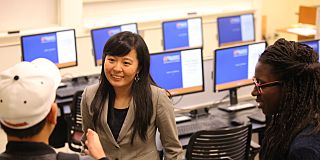Benefits of ICE Sponsorship
McIntire’s corporate ICE sponsors not only develop close and lasting relationships with McIntire faculty members and students, they also benefit from the superb analytical skills, creativity, and fresh perspectives that students bring to the complex business problems with which sponsors present them.
ICE also offers sponsor companies a powerful recruitment tool as they search for their businesses’ next generation of leaders. Watching McIntire students problem solve gives sponsors the opportunity to gauge their academic caliber, analytic skills, and work ethic, as well as their leadership abilities and personal traits. Partnering with McIntire as an ICE sponsor affords businesses access to some of the world’s most promising young businesspeople—outstanding potential employees who have gained a deep familiarity not only with the dynamics of a sponsor company, but also with the challenges and opportunities the sponsor company faces.
Watch this video to discover why CarMax values partnering with ICE to shape the next generation of business leaders.






![Target Audience Optimization: A Strategic Growth Plan For [solidcore]](https://res.cloudinary.com/mcintire/image/upload/g_auto,c_fill,fl_progressive,f_auto,e_sharpen:100,w_500,h_267/dpr_auto/v1715967643/solidcore logo_x5Xzte7D.png)